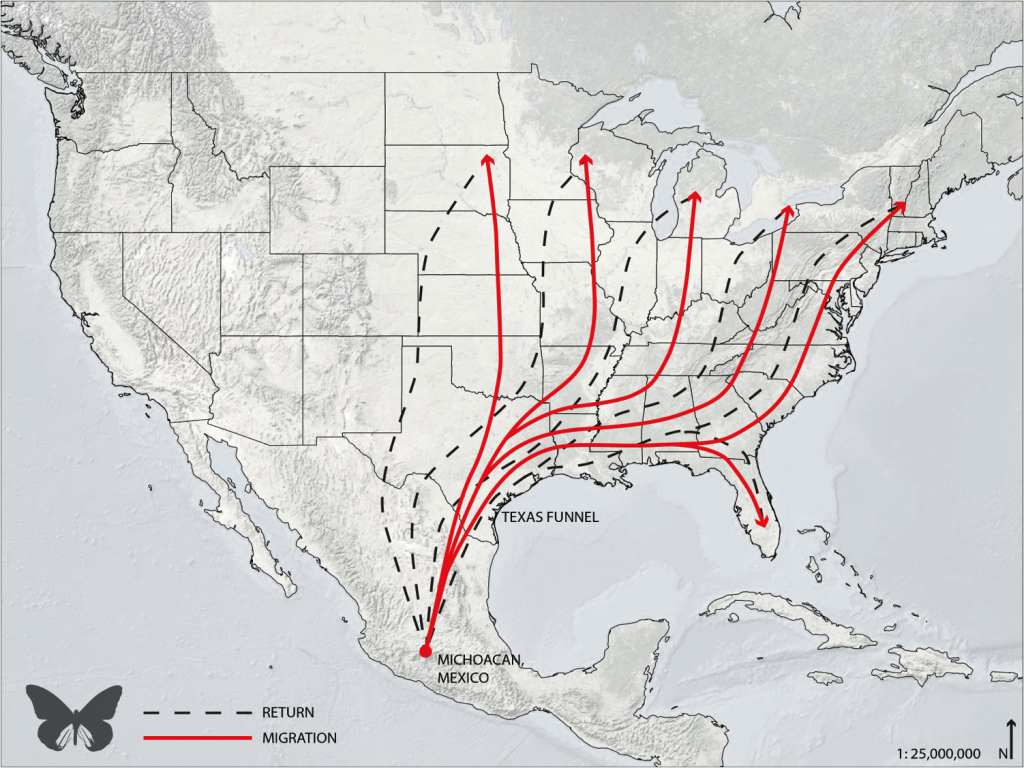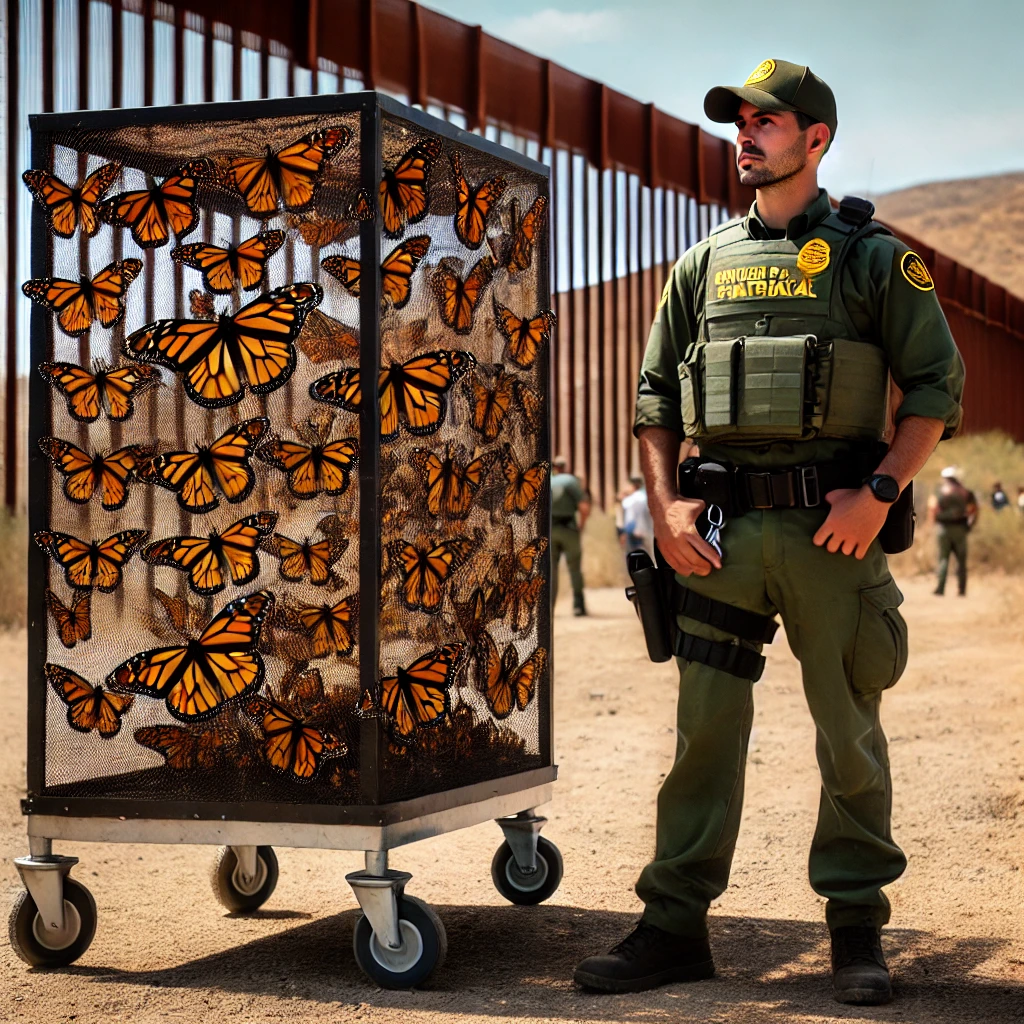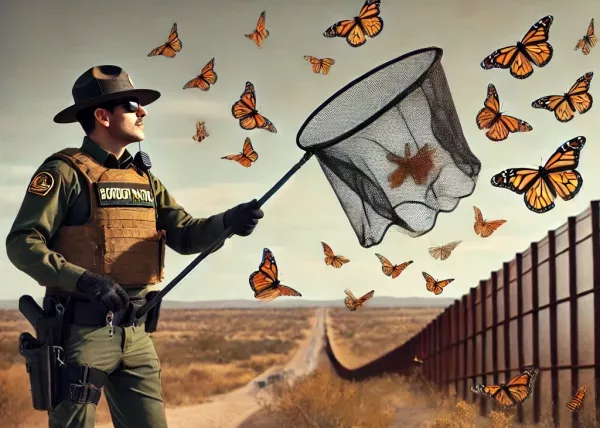Border agents seized hundreds of monarch butterflies along the Texas border this week as the iconic orange-and-black insects made their way north from their Mexican overwintering sites on their annual spring migration.
The butterfly round-up is part of President Donald Trump’s “mass deportations” policy to address immigrants illegally entering the U.S. via the Mexican border.
“They captured me, made me put my wings up, and wouldn’t let me explain that I’m from here,” a butterfly tagged AGPC013 explained. “If they’d just look into it, they’d see I was born in Dallas and tagged on the Llano River last fall,” the male monarch said.

Monarchs must cross the Texas border during their spring migration north from Mexico and fall migration south from Canada. –Map by Texas Butterfly Ranch
Troopers with the Texas Department of Public Safety (DPS) encountered the migrants among two large groups. The first batch of 230 illegal butterfly immigrants was apprehended on March 28.
Butterflies born in the U.S. and already settled here were also part of the seizure, a result of the Trump administration’s new birth-is-not-citizenship policy.
The seizure was executed by federal agents armed with butterfly nets and metal cages on wheels. Among that group: 27 monarchs from Michoacán, and dozens more from Jalisco, Guanajuato, Zacatecas and Durango, according to a statement issued by the DPS.
Several detainees explained they were enroute from their ancestral roosting sites in the mountains west of Mexico City to “launch the next generation of monarchs.” All were turned over to federal authorities.
“We’re just enforcing the law,” said Miguel Hernandez, a border patrol agent who had just netted 10 captives nectaring on Straggler daisy blossoms near the National Butterfly Center at Mission in the Rio Grande Valley. The Butterfly Center is located just a half-mile from the Texas-Mexico border.

Border patrol agent guards detained monarch butterflies awaiting transport. –Photo by Misha Kahn
The butterflies in question have been accused of stealing jobs and resources from native butterflies and other wildlife. They lay their eggs on milkweed plants that hatch and consume the plant’s foliage, decimating some milkweeds, leaving little to the “native flyers,” proponents of the policy claim.
Some of the male monarchs are said to belong to “insect gangs” according to Border Patrol sources, who said existence of the gangs was unknown until the election of President Trump.
Those who oppose the policy point out that monarch butterflies–which migrate over multiple generations from Mexico through the U.S. and Canada and back each year–actually contribute to the health of the ecosystem by providing free ecosystem services like facilitating plant reproduction by pollinating plants.
“They don’t even get paid,” said Samuel Black of the Insect Protection Society, a nonprofit organization based in Portland, Oregon, devoted to invertebrate conservation.
One female butterfly that survived the journey to Mexico from Texas and was making her return north shared with reporters that she was illegally seized and tagged in the Texas Hill Country last fall.
“I was flying south, minding my own business when someone with a butterfly net snagged me, manhandled me, and put a sticker on my wing that I had to carry all the way to Mexico,” said the butterfly, who chose to remain nameless. “I was born in Texas!”
The butterfly added that the sticker–known as a tag in citizen science circles–fell off at some point on a rainy day in the forest at El Chincua sanctuary in Michoacán.
Two butterflies caught in the act of copulation on a Mountain Laurel tree near the border were also seized. The female was able to avert the net momentarily and laid an egg on a nearby Antelope horns milkweed plant that was sprouting on the Texas side of the border.
Whether or not the butterfly that hatches from that egg will be considered a native Texan or be deported remains to be seen, given President Trump’s recent bid to end birthright citizenship, which has been guaranteed by the 14th Amendment of the U.S. Constitution since the end of the Civil War.
The butterflies will be held about 50 miles southeast of San Antonio at the Karnes County Detention Facility, a South Texas immigration detention center that has recently been repurposed by the new administration.
TOP PHOTO: Border patrol agent seizes monarch butterflies along the Texas-Mexico border.–Photo by Misha Khan
Related articles
- Drought, winds and wildfires await migrating monarch butterfly spring migration in Texas
- Monarch butterfly numbers in Mexico vault 99% over last year’s historic low, California population teetering
- Monarch butterflies listed as “threatened” under the Endangered Species Act
- A tense online debate: raising monarch butterflies at home
- New study: monarch migration at risk, monarch butterflies are not
- USFWS rules monarch butterflies worthy of protection, but they don’t have resources to protect it
- As ESA listing looms, new study challenges dogmatic narrative that monarchs are in decline,
- Declining monarch butterflies: Mexico population drops 59%, West coast population down 30%
- Recent IUCN “endangered” listing creates confusion for monarch butterfly fans
- IUCN revises listing of monarch butterfly from “endangered” to “vulnerable”
- Endangered Species Act: wrong tool for monarch butterfly conservation?


This post is in poor taste. It says “we’re just enforcing the law” but the law, if it addressed the migration, would says the opposite. Please stick to Monarch science and leave the satires and digs to journalists getting paid to promote their media outlet’s agenda according to their political slant.
Get a life! Given the disastrous situation we are currently experiencing in our country, a little humor gives us a chance to remain sane.
I’m disappointed that this site is political. It makes me not trust the information you put out on other things. Sad to see.
Environmental damage and the effect on monarchs is 100% political
Brilliant, Monika!
I laughed my ass off all the way through the article! Liberals, get a life and a sense of humor! We can take care of our monarchs and get rid of illegal criminals at the same time!
How very unprofessional. I didn’t follow this site to read about your political opinions. I thought this was an educational site regarding butterflies. Keep the political b.s. to yourself. Screw your attempt at satire. I’ll be unsubscribing now. Bye idiots.
Thanks for writing this. It’d be funnier if it wasn’t so close to the truth of what is happening to human beings. What is happening to humans is in poor taste.
I thought I was looking at the Onion. Great April 1st absurdity to bring more light to the real, human absudities taking place.
This would be funny except that ICE is deporting humans with logic that is just as flimsy and cruel.
I thnk it’s damned cute! And I bet some were carrying fentanyl.
Hilarious! April Fool!😆
I love it! Great post for April 1st.
I think Raymond might be on to something,….
Absolutely loved it? I cried laughing so hard. Rose
I agree with Howard. Political talk is everywhere and I know where to find those conversations. Don’t need to read it here.
I agree! Unsubscribing!
It is extremely poor taste and disgusting behavior to write a “joke” article about the illegal capture and holding of humans in this country. People are dying in detention centers after being illegally abducted from their homes, work, and the streets. There’s currently a father who was kidnapped and trafficked to El Salvador for having an autism awareness tattoo. Now the government says they can’t get him back. I have family and friends who are terrified to go outside or to speak up for fear of the government “disappearing” them. One of my closest friends has even fled the country to Canada for fear of persecution for being nonbinary.
Human rights are not a topic to take lightly or joke about. Please take this down.
Correction, the father from Maryland is separate from the man with an autism awareness tattoo.
Hey everyone,
As someone from a mixed status family making light of the situation on the border is in poor taste. I understand that it is a joke but many of us have to deal with the reality of their grandparents coming to visit their kids from Mexico and being worried that they will be put into a detention center where we cannot find.
Please don’t compare monarchs to illegal immigrants. There’s a vetting process that anyone can go through to become an American citizen. Which is to protect Americans from terrorism and criminals, etc.
Hilarious. Keep up the great commentary.
Unfortunately everything is political these days. I personally believe that it is time for everyone to speak up in every forum possible. One recent example is the significant weakening of the 1918 Migratory Bird Treaty Act and I am sure there are many more that may seem unconnected but they really are. for example, firing 1,000 national part rangers, but they may or may not have there jobs again. Another, denial of climate change. Etc etc etc. Peace.
why did you have to bring politics here?
I’m out.
This was brilliant. I respectfully disagree with the well-meaning folks here who think the comparison is in poor taste, given the human rights catastophy that is being carried out deliberately by our government. I get their point, but I think the satire here works to challenge some readers on the other side of this issue, to open their eyes a little, and I hope we can go at this from all angles. And to the people who think conserving monarchs and other pollinators has nothing to do with politics…well, you might want to sit with that thought a little longer.
I started to say, thank you Marie, but then I realized – ya got me again!
Agree with that completely
This is not human rights it’s breaking our laws to take advantage of our generosity. Law breakers are not welcome and need to go back to where they came from.
We have no idea if these people are breaking the law, because they were denied their due process. The administration admitted today that at least one of them did not break the law, and was granted the right to be here by a judge, but pretended to be unable to bring him back. This is the kind of thing that would have come up with due process, which is their right. Have a good week.
The human rights violation is shipping them off to a the equivalent of a torcher chamber in El Salvador. We have no idea if these people are breaking the law, because they were denied their due process. The administration admitted today that at least one of them did not break the law (and was granted the right to be here by a judge) but then pretended to be unable to bring him back. This is the kind of thing that would have come up with due process, which is their right. Have a good week.
The human rights violation is shipping them off to a the equivalent of a torcher chamber in El Salvador. We have no idea if these people are breaking the law, because they were denied their due process. The administration admitted today that at least one of them did not break the law (and was granted the right to be here by a judge) but then pretended to be unable to bring him back. This is the kind of thing that would have come up with due process, which is their right. Have a good week.
I realize it’s April Fool’s day. But your story missed some points. Butterflies add to every location they land in and don’t expect free food, free housing, free medical treatment or free cell phones. They enjoy what nature has provided or those, who in charity- have grown for them .
Plus butterflies do not commit crimes against their hosts.
Ha ha!!! April Fools!!!
Thanks to the author for this hilarious parody. There are those who apparently have no sense of humor. No, there is definitely nothing funny about what is happening to human beings in our country right now.
Unsubscribing now. You do not need to create a political environment with obvious bias (even in jest or April Fool’s joke). I read your blog for uplifting information about the Monarch and that is all.
Seriously 😐 UNSUBSCRIBING
On target April Fool’s!
The best thing people can do if they don’t agree is to hit the button that says I am not interested in this news corporation on Google.
Hilarious! Thanks for the mid-afternoon laugh after a stressful (so far) tax season
THIS IS JUST HOW I WANTED TO END MY DAY, CRACKING UP!!! 🙂
Love it!
Loved the picture of capturing migrating Monarchs!
Tongue in cheek,
I would like to point out that the butterflies are in fact American citizens because their parents were.
The lesson here is to apply for your passport card well in advance of flying internationally, so you receive it in time and have it on your “person.” If you lose your passport, you can visit the local American embassy.
On a serious note, it is interesting that Democrat presidents and candidates have said they would enforce our laws; then-President Obama even started to build the wall. Enforcing our laws should not be political, it should be our way of life.
Shame on you for posting this, wake up!!
Love it! Brilliant! It brings to life the cruelty of the current administration, hunting down, beating and kidnapping people who work hard, pay taxes and do the jobs most citizens won’t do. The analogy of the beautiful, lovely gentle butterfly to the fruit vendor working hard all day only to get disappeared by the cruel illegal administration hits the point perfectly. All you losers, get a life and pay attention to government who will be taking away rights of citizens, rather more citizens.